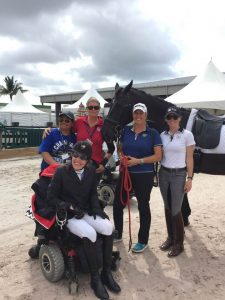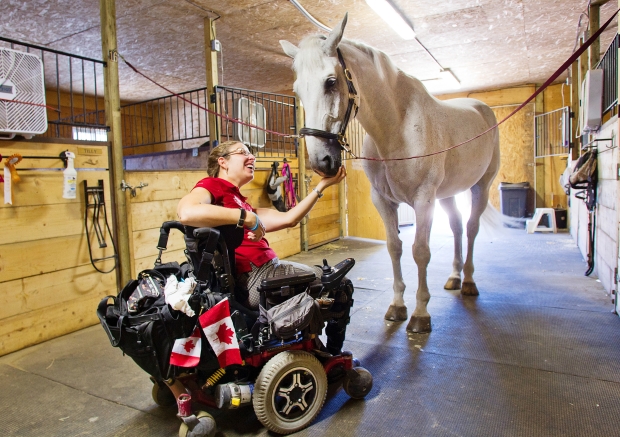Paralympic athlete, Jody Schloss, trains in Oxford Mills at Swan Manor with her horse Rebus
Photograph by: Wayne Cuddington, Ottawa Citizen
At 38 years of age, Jody Schloss is fulfilling a dream. She is flying to the United Kingdom to join her horse Inspector Rebus to compete in the Paralympics at Greenwich Park, London, starting next Wednesday.
Schloss is one of four members of the Canadian Paralympic Equestrian team that won two individual medals in dressage at the Beijing Paralympics. Schloss is the newest member of the team and the only one not to have competed at a previous Paralympic Games.
“Jody’s motivation and commitment has earned her a well-deserved spot on the Canadian Paralympic Team and we are very excited to have Jody as a member of the team for the 2012 London Paralympic Games,” says Amie O’Shaughnessy, Director of Para-Equestrian and Paralympic Team Manager at Equine Canada. “Jody is an inspiration to all of the team members for her victories both in and out of the competition ring, and she is a great role model for all athletes across Canada.”
Dressage, often described as ballet on a horse, is the only equestrian discipline included in the Paralympics. Julie Cull from Equine Canada, the governing body for horse sport in Canada, defines the parameters for the sport so that the playing field is level.
“Para-Equestrian sport provides riders with a physical disability the opportunity to compete against other riders with similar abilities. Riders are given a grade based on their functional ability, and are judged on their riding skill against other athletes of the same Grade,” she says. “There are five grades of competitions in dressage, with Grade IA representing the more severely impaired riders, and Grade IV representing the least severely impaired riders.” Schloss falls into Grade 1A.
Schloss, originally from Toronto, but now living at The Court Retirement Home in Barrhaven, has been confined to a wheelchair since the year she graduated from the University of British Columbia. She set out in a car with a friend for a trip of a lifetime to Central America, but an accident killed her friend instantly and left Schloss with a brain injury and extremely limited movement.
That, however, has not stopped Schloss from getting back in the saddle.
In fact, soon after she awoke from a three-month coma, she was asked what she wanted to do and she managed to type out, “ride.” At the time she couldn’t even sit up. Now, many years later, not only can she sit up and even walk a few steps, but she can also ride a horse using a conventional saddle and holding the reins. In fact, Schloss feels that riding has actually helped her physical progress.
“Riding has definitely helped my physical rehabilitation,” she says. “Originally after my injury I started riding at CARD the ‘Community Association for the Riding Disabled’ in Toronto. Even then, the therapists at rehab. said they could tell when I had been riding because my trunk was much more stable the next day, and as I started to ride competitively it continued to improve.”
It may be hard to believe, but it takes incredible strength to ride a horse. Muscles are needed to give your torso stability, to hold you in the saddle, to make your legs work, to hold the reins and to move in rhythm with the animal as it moves beneath you. Anyone who thinks that riding a horse is akin to sitting in a moving armchair has never ridden a horse.
In order to make a horse perform the movements necessary to complete a dressage test, a high level of communication is needed between horse and rider. This is built upon a foundation of trust, but also through subtle leg, hand and body movements that indicate to the horse what he needs to do. Try doing that when you have a brain injury that affects fine motor skills.
Schloss does it just fine, though. Her foundations are solid. She has been riding since she was 11. She bought her first pony when she was 13 and sold him to go to university. She has a close bond with her big grey horse Rebus, who is happy to nuzzle her, blow his nostrils in her face and play with her while he is being prepared for riding in the stable. Thanks to Parelli, a form of training horses that focuses on developing a deep bond and communication between horse and rider, Rebus is also happy to allow himself to be led by Schloss as she makes her way out to the riding arena in her wheelchair. Plenty of other high-level competition horses would promptly bolt at the sight and sound of it.
Schloss and Rebus have been partners since March 2011, when Lauren Barwick, one of the other team members and a dual medallist in Beijing, found him for Jody. Since then she has competed in Florida and in the U.K. in order to qualify for the Paralympics. The pair were to spend three weeks prior to the competition preparing at Bishops Burton in Yorkshire. At Greenwich Park, she will perform three dressage tests in front of a panel of international judges, one for a chance at an individual medal, one for the team score and one set to music, which is called freestyle.
Schloss, who put her master’s program in disability studies on hold to focus on the Paralympics, trains with accomplished dressage rider Jessica Rheinlander in Oxford Mills, near Kemptville. She takes several lessons weekly from Rheinlander, who is specialized in para-equestrian development and treats Schloss just like any other rider.
“She quickly learns to get around what her body can’t do,” says Rheinlander, who goes on to explain that because the movements that Schloss is expected to perform with her horse are more limited than would be asked of an able-bodied rider, accuracy becomes one of the most important parts of the test. The pair will be asked to perform a series of linked circles of many different sizes, serpentines, direction changes and transitions between walk and halt while maintaining an active, forward-moving momentum.
Rebus was flown across the Atlantic in early August. “He’s a good flyer,” Schloss says. “When all the other horses were nervous, he just ate his hay.”
While her horse might be totally relaxed about the whole endeavour, Schloss, whose mother will join her in London, admits to the nerves. “I’d be lying if I said “no” that I wasn’t nervous,” she says, “but it helps that I’m out there with Rebus.”
© Copyright (c) The Ottawa Citizen


